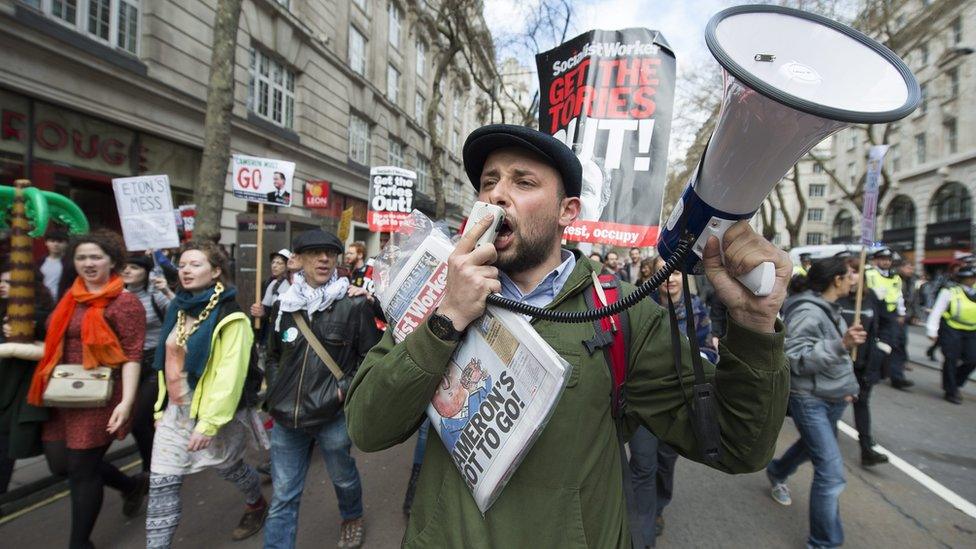Is David Cameron a tax avoider?
- Published
- comments

Revelations about David Cameron's financial affairs have led to street protests
One person's tax planning is another person's tax avoidance - so whether David Cameron's tax affairs are controversial or not is really a matter of where you stand on the payment of tax.
Most tax accountants would advise a wealthy family on "gifts" - payments of money - to their children and how to ensure they are not liable for inheritance tax by making payments in tranches to avoid breaching tax thresholds.
Mr Cameron's family appear to have done this, and Downing Street says the payments were made by the Prime Minister's mother to "even out" the inheritance payments made to her children following her husband's death.
Not to avoid tax.
When Mr Cameron's mother dies, her estate becomes liable to inheritance tax. Under the "seven-year rule", if she dies before 2018, the value of that estate will include earlier gifts to her children.
The rule was put in place to stop parents simply transferring assets to their children shortly before they died to avoid tax liabilities.
Some may argue that it is morally wrong and that everyone should order their affairs so they take no advantage of rules which allow people to pay less tax on their wealth.
And, of course, many millions of people are not wealthy enough to ever have to consider such issues.
Whatever critics may desire, the UK's tax law is not governed by a "morality code", it is based on statute and is structured so that people, by following the rules, pay no more tax than they are legally obliged to.
In fact, in one part of Mr Cameron's tax affairs, he has actually paid more tax than legally necessary, by waiving the tax-exempt £20,000 allowance that prime ministers receive to cover the expenses of holding the office of PM.
He still faces questions, though.
Downing Street is providing no details about the £72,000 the PM received for selling "other shares" beyond his investment in Blairmore Holdings.
Or the £40,000 he received in cash from his stockbroking account.
It is argued by some that Mr Cameron should reveal which shares he invested in and how he structured those investments.
Also, it is worth noting that revealing tax returns reveals very little about a person's absolute wealth - which is a wholly different matter and one which the French economist, Thomas Piketty, would say is the real issue at hand when it comes to debates about wealth inequality.
As he did in an interview with me last week.
What the PM has done today is change the rules on what politicians will be obliged to reveal about their formerly private tax affairs.
It is difficult to see how any member of the Cabinet, and indeed the whole government, can refuse to give details of their own tax affairs going back six years.
To refuse would raise the question - why not?
Members of the Opposition front bench will be under similar pressure - pressure that goes beyond, for example, what John McDonnell, the shadow chancellor, has so far published.
In six short days, the prime minister has travelled from a position of "this is a private matter" to a personal tax shock and awe.
For politicians, and possibly many other people, he has changed the long-held principle that tax is a private matter in a way that will reverberate for many years to come.